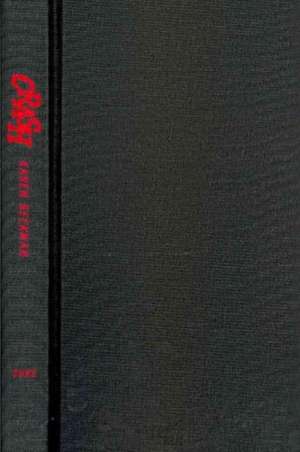Crash – Cinema and the Politics of Speed and Stasis
Autor Karen Redrobe Beckmanen Limba Engleză Hardback – 2 aug 2010
Preț: 667.50 lei
Preț vechi: 730.99 lei
-9% Nou
Puncte Express: 1001
Preț estimativ în valută:
127.73€ • 133.69$ • 106.31£
127.73€ • 133.69$ • 106.31£
Carte indisponibilă temporar
Doresc să fiu notificat când acest titlu va fi disponibil:
Se trimite...
Preluare comenzi: 021 569.72.76
Specificații
ISBN-13: 9780822347088
ISBN-10: 0822347083
Pagini: 320
Ilustrații: 98 illustrations
Dimensiuni: 163 x 242 x 27 mm
Greutate: 0.59 kg
Editura: MD – Duke University Press
ISBN-10: 0822347083
Pagini: 320
Ilustrații: 98 illustrations
Dimensiuni: 163 x 242 x 27 mm
Greutate: 0.59 kg
Editura: MD – Duke University Press
Cuprins
AcknowledgmentsIntroduction; 1. Jerky Nearness: Spectatorship, Mobility, and Collision in Early Cinema; 2. Car Wreckers and Home Lovers: The Automobile in Silent Slapstick; 3. Doing Death Over: Industrial-Safety Films, Accidental-Motion Studies, and the Involuntary Crash Test Dummy; 4. Disaster Time, the Kennedy Assassination, and Andy Warhols Since (1966/2002); 5. Film Falls Apart: Crash, Semen, and Pop; 6. Crash Aesthetics: Amores perros and the Dream of Cinematic Mobility; 7. The Afterlife of Weekend: Or, The University Found on a ScrapheapNotes; Bibliography; Index
Recenzii
Karen Beckmans new book, Crash: Cinema and the Politics of Speed and Stasis, is an inventive exploration of the startling figure of the car crash in the history of film, critical theory, and art practice. In this compelling book, Beckman invokes the crash as a way of working through questions of mobility and stasis, security and transgression, medium hybridity, and technology, spectatorship, and the body in new and exciting ways. Moving fluidly from the comic and reflexive moments of the car crash in early and silent cinema, to concerns with accident and trauma, especially in non-theatrical films from the thirties to the sixties, and then to the more contemporary work of Warhol, Ballard, Iñárritu, Godard, and Davenport, Beckman exhibits an impressive range of historical, artistic, and theoretical interests, while showing convincingly how the trope of the car crash weaves its way into the cultural life of the twentieth century in ways that parallel Wolfgang Schivelbuschs pioneering work on the train accident in the nineteenth century. This is a path-breaking book of broad interest to readers in art history, film studies, and critical theory. D. N. Rodowick, Professor of Visual & Environmental Studies, Harvard UniversityCrash: Cinema and the Politics of Speed and Stasis is an extraordinarily original intervention in contemporary technophilic discourses (even critical ones) focused on speed and mobility. As it resonates through a variety of cinematic and literary texts, Karen Beckman views the car crash vividly (and viscerally) as a startling visual image, narrative thematic, and critical metaphor for what drives our contradictory desires for automobility, inertia, feeling, and community on a collision course both productive and destructive. As she moves across theories and disciplines, Beckmans textual and cultural analyses come together in a work that is passionate, illuminating, and politically engaged. Crash is a major contribution to film and media studies, comparative literature, art history, and cultural studies and, indeed, is a model of interdisciplinary scholarship. Vivian Sobchack, author of Carnal Thoughts: Embodiment and Moving Image Culture
Notă biografică
Karen Beckman
Textul de pe ultima copertă
""Crash "is an extraordinarily original intervention in contemporary 'technophilic' discourses (even critical ones) focused on speed and mobility. As it resonates through a variety of cinematic and literary texts, Karen Beckman views the 'car crash' vividly (and viscerally) as a startling visual image, narrative thematic, and critical metaphor for what drives our contradictory desires for 'automobility, ' inertia, feeling, and community on a collision course both productive and destructive. As she moves across theories and disciplines, Beckman's textual and cultural analyses come together in a work that is passionate, illuminating, and politically engaged. "Crash" is a major contribution to film and media studies, comparative literature, art history, and cultural studies and, indeed, is a model of interdisciplinary scholarship."--Vivian Sobchack, author of "Carnal Thoughts: Embodiment and Moving Image Culture"
Descriere
Considers the popular cinematic trope of the car crash as a metaphor for the relationship between aesthetics, politics and interdisciplinarity
